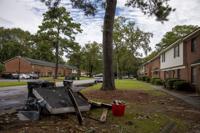South Carolina renters no longer need to pay thousands of dollars to appeal an eviction after the state’s chief justice reversed a widespread practice that had long derailed legal challenges.
The change makes it much easier to have an eviction order reviewed by a higher court and removes a critical barrier that few tenants seeking an appeal had been able to clear. Magistrates around the state previously required tenants to first pay all the past-due rent they allegedly owed before their appeal could go forward — even if they were challenging the amount due.
In a recent memo, Chief Justice Donald Beatty instructed magistrates to stop doing so, saying it ran counter to the law. The change took effect in August, just weeks after The Post and Courier reported that the practice had derailed more than 120 appeals since the start of 2019. The newspaper also found that when they set a higher bar for an appeal, magistrates regularly cited laws that didn't apply to home rentals.
The state’s Landlord and Tenant Act, however, only specifies that a tenant challenging an eviction needs to keep up with their monthly rent while their appeal is being heard. By adding past-due rent, Beatty concluded, judges were applying the law incorrectly. Court records show the practice dates back several years, but it's unclear when it first took hold.
“Nowhere in that statute is payment of past due rent required to stay the execution of judgment pending appeal,” the chief justice wrote.
The Post and Courier’s analysis of court records found that people who appealed an eviction were given less than a week to pay more than $3,000, on average. They include renters who claimed their landlords had inflated the amount they owed by charging improper fees, failing to record payments and declining to credit them for repairs they paid for.
Still, if they failed to pay — and most did — their appeals were dismissed.
That essentially removed a key check on lower court decisions in a state where magistrates aren’t required to have formal legal training to sit on the bench. A majority of magistrates here aren’t licensed to practice law. Appeals are heard by the circuit court, where judges must have a law license.
Court records show that magistrates were inconsistent in applying the law that deals with eviction appeals, which is tangled and ambiguous. A handful of magistrates even ordered tenants to pre-pay three months of rent on top of what they allegedly owed. That happened to a woman in Greenville who was ordered to pay the equivalent of 11 months’ rent after she said her landlord walked away from a payment plan they’d worked out. State law only gives tenants five days to pay.
Housing advocates said such onerous requirements blocked renters' right to an appeal. The practice of requiring past-due rent, meantime, had been widespread. The Post and Courier’s analysis identified cases in 12 of the state’s 46 counties, including the state’s largest cities — Charleston, Columbia and Greenville.
Under the chief justice's instructions, tenants will only be required to pay their regular rent as it comes due — a requirement intended to ensure that landlords don’t lose income because of an appeal. If renters don’t pay on time, their case will be dismissed, as the Landlord and Tenant Act requires.
The change is a win for housing attorneys who had long challenged magistrates' interpretation of the law one-by-one. Nicole Paluzzi, an attorney for Charleston Pro Bono Legal Services, said Beatty's memo matched "what we have been arguing all along."
“I think this is a pretty substantial change and one that hopefully will align court practices with the law,” said Adam Protheroe, an attorney for S.C. Appleseed Legal Justice Center in Columbia.
Protheroe said he encountered the issue as a legal aid attorney helping renters, and he often argued for an interpretation of the law similar to the one in Beatty’s order. But making that argument was difficult: When magistrates required hefty payments, he had little time to challenge the amount, and even when he was successful and kept the appeal alive, it was a time-intensive process.
The odds of a renter successfully navigating that process on their own were “very low,” he said.
"pay" - Google News
October 17, 2020 at 09:01PM
https://ift.tt/3k8VoWi
SC renters no longer need to pay thousands to appeal evictions, chief justice says - Charleston Post Courier
"pay" - Google News
https://ift.tt/301s6zB
Bagikan Berita Ini
















0 Response to "SC renters no longer need to pay thousands to appeal evictions, chief justice says - Charleston Post Courier"
Post a Comment